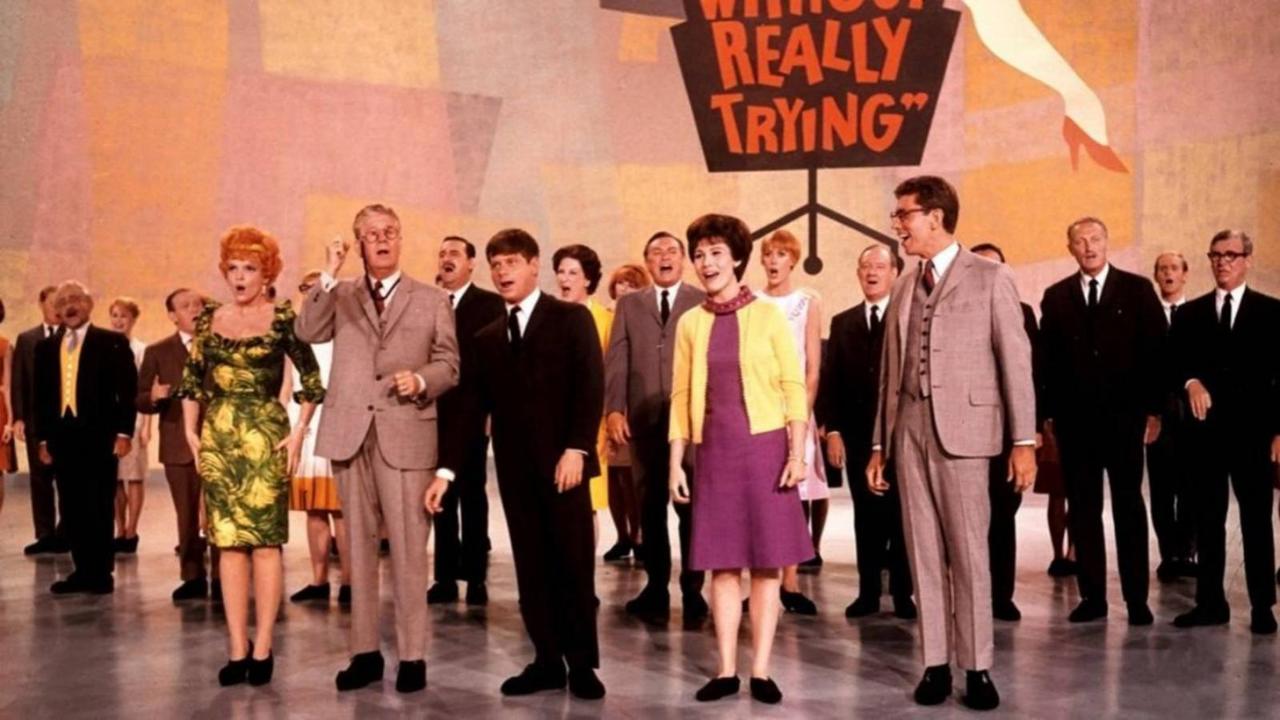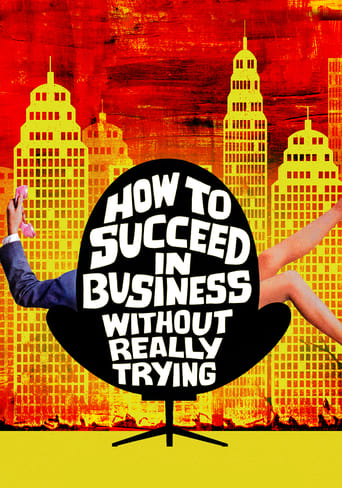

Wow! Such a good movie.
... View MoreExcellent, Without a doubt!!
... View Moren my opinion it was a great movie with some interesting elements, even though having some plot holes and the ending probably was just too messy and crammed together, but still fun to watch and not your casual movie that is similar to all other ones.
... View MoreI didn’t really have many expectations going into the movie (good or bad), but I actually really enjoyed it. I really liked the characters and the banter between them.
... View MoreThis is an interesting musical. Unlike many movies that were originally Broadway musicals, this film does little to try to make it look like a movie. Instead, it plays a lot like watching a play--complete with many musical and dancing numbers where you can easily see how it was performed on stage. Now this is NOT meant an a negative--just stating how it's almost like watching a filmed version of the play. And, because of this, the sets are often very surreal--like sets from a play that are easily moved and disassembled. And, if you are interested, this play is currently playing on Broadway--with Daniel Radcliff in the revival. I am not sure if tickets are now so expensive because of its star or because it's a darn good musical--but I suspect it's both.The innocuous looking Robert Morse stars in the film (he played the same role on stage previously). He's a very, very cynical young man who used a book entitled "How To Succeed in Business"--and follows it for his meteoric rise through the ranks of a corporation. In fact, in only a matter of days, he moves from the mail room to a vice president...and his stock keeps on rising. Along the way are a lot of peppy and cynical songs--my favorite of which is "A Secretary is NOT a Toy" though "I Believe in You" has become a standard. And, to get ahead, he sucks up, manipulates and lies--all which the movie seems to heartily endorse, as in every case Morse is wildly successful! As a result, it's a funny comedy and ultimate movie for cynics! I thoroughly enjoyed it--and I really don't even like musicals all that much! Apart from good songs, a fun and goofy plot and good acting, the film manages to be entertaining and new. There just aren't any other films like it--and it's a bit surprising that it didn't make Morse a star, as he was very good here. Ironically, he's been brought back to the small screen for a recurring role on "Mad Men"--a drama that seems, at times, inspired by this film.By the way, George Fenneman plays himself. If you wonder why his face is familiar, he was the announcer for the TV show "You Bet Your Life". Also, doesn't the boss' nephew look a LOT like a 1960s version of Napoleon Dynamite?! Look at him yourself--you'll see what I mean.
... View MoreDon't let the 1967 release date fool you. This is really a 60s musical spoof of the 50s. The book and the original draft of the Broadway version were written in the 1950s, and the Broadway musical came out in 1961. One of the clues of its 50s roots is in the treasure hunt TV show's concern over proving it wasn't rigged -- a reference to the quiz show scandals of the 1950s. I saw the original Broadway show, and had listened to the Broadway cast LP album, when I was a kid. I enjoyed it, but it's so long ago, I can't really compare the two reliably. I do think the Broadway version had more power, and the album seemed to have more music. I see that the movie dropped some numbers of Rosemary's, and gave her the first version of "I Believe in You." This was a big mistake. Finch singing "I Believe in You" to the mirror was the highlight of the show. It was a love song to himself, a sign of his total narcissism. The movie's approach makes it seem like he is thinking of Rosemary, and that Rosemary believes in him. Plus, there is too much dancing around in the men's room while he sings -- he should be looking at himself in the mirror, singing it to himself, as though he is in love with himself. So the movie took some of the edge off; it could have been better. I think it is easier to tell a story like this, absurd and surreal, on stage more easily than in a movie, where the viewer, especially a modern one, expects a bit more realism. You really have to suspend disbelief totally and go along for the ride to enjoy this movie. If you do, you can enjoy it, and really laugh, even thinking about it when it is over. We know where the story is going, but there are enough twists and turns to make it surprising and amusing. It is interesting looking back on this movie so many decades later. There is real wit here, not just gimmicky slapstick, if you pay attention:Finch reading The Book as he begins his day as a window washer: "If you have education, intelligence and ability, so much the better. But remember that thousands have reached the top without any of these qualities."It is humor that stands the test of time, especially in light of what we have seen of Wall Street in recent years -- you get the feeling there are a lot of Finches who have risen to the top without qualifications running the show in many businesses. It is sad, but this movie is an opportunity to laugh at them.The American 50s and 60s were actually pretty hip, and capable of a satirical look at itself. A year after this movie came out, Mel Brooks released The Producers. I see there is a recent revival of the Broadway version of How to Succeed. Robert Morse really defined the part, though he reminds me of a young Jim Carrey. But I don't think he's such a lock, as Zero Mostel was with The Producers. So I think this could be one of the better revivals, if done right. When you watch How to Succeed, at first it seems like a look back at a simpler time of clearly defined male and female roles in the workplace, etc. But really what you are seeing is art making fun of those roles, and the beginning of more modern values, for the 60s were the beginning of our modern world. And in some ways, the 60s were more modern and hip than America is today, for a large portion of America is becoming more conservative, and less willing to laugh at itself. So when you watch How to Succeed, think about some young yuppie climbing the corporate ladder today, and it will all make sense. Of course, Hedy LaRue didn't need The Book to succeed; she had other assets. I've got to add that I loved the scene of Morse dancing down Park Avenue, with a film truck driving alongside him, secretly filming him. New Yorkers are so cool and nonchalant that nearly everyone just ignores him. Maybe they thought he was doing a Teaberry Shuffle ad.And did you notice that World Wide Wickets is abbreviated WWW? Cool.
... View MoreAll the while I was watching this boring and dated movie I kept thinking to myself, "This guy (Robert Morse) is trying to be Jerry Lewis and failing!" In fact, this would have been a much funnier movie with the real Jerry Lewis as the star. To me, Morse is just not funny. Given all the positive reviews here, it must be a personal thing. Also, I never saw the original Broadway show, which I suspect would have been a more natural vehicle for someone like Morse.I gave the movie 3 stars rather than 1 because I found it hilarious to see what passed for "good taste in office decor" back then. Yikes. Made me wish I was color-blind.
... View MoreToday, at 77 years old, Robert Morse is still going strong as Mad Men's Cooper, but there's no question that his heyday was the late '50s to the early '70s, when his toothy grin, amiable tenor and boyish acting made him the toast of Broadway. Here, he repeats his Broadway success as J. Pierpont Finch in "How to Succeed In Business Without Really Trying," a 1967 film also starring Michele Lee, Rudy Vallee, and Anthony Teague. Lee and Vallee also repeat their Broadway roles.With music and lyrics by Frank Loesser and book by Abe Burrows, "How to Succeed" is the story of window washer J. Pierpont Finch, who in a matter of days, thanks to a book he carries around by the same name as the film title, has risen through the ranks of the Worldwide Wicket Company without doing any work. He has his enemies, but one very good friend in Rosemary (Lee), a secretary with a crush on him who wants Ponty, as he is called, to make good.I'm not all that familiar with the musical, but I understand that there are several songs missing, including "Happy to Keep His Dinner Warm." The standouts are "I Believe in You," which became a hit song, and the rousing "Brotherhood of Man." What makes the music for me is the wonderful orchestrations.Sexist today in some of its themes, this is a brightly-colored musical, done the old-fashioned way, without cutting the numbers to pieces. Morse is delightful and never had any trouble adapting to film. Ditto a young, pretty Lee who sings "I Believe in You" like a dream. Vallee is well cast as the head of the company who has a girlfriend on the side. Anthony Teague is very good as the boss' nephew, but Charles Nelson Reilly played this role on stage, and I can only imagine how hilarious he was in the role.Good movie, and director David Swift keeps the pace moving.
... View More